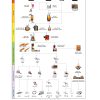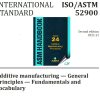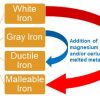Within the testing community, NDE is not the only term used to describe the method in question. People have varied the terminology based on their specific application and information derived from the test. The terms are similar but with subtle differences:
Nondestructive Testing (NDT) generally refers to the actual test only.
Nondestructive Evaluation (NDE) implies not only the test but also its role in the process. This is the most general definition among all the terms.
Nondestructive Examination (NDE) is typically used in areas other than process control.
Nondestructive Inspection (NDI) is, like nondestructive examination, typically used in areas other than process control.
Nondestructive Characterization (NDC) refers to the specific characterization of material properties. NDC, of all the references, probably has the most restricted use.
Nondestructive Sensing (NDS) generically refers to the use of sensors to derive information nondestructively. Here there is no specific implication that the object will be returned to service, although it could be.
Although these various terms are designed to create distinctions, most are used interchangeably. NDT, NDE, and NDI are the most common and are generally nonspecific.
Ref. Nondestructive Evaluation: Theory, Techniques, and Applications. Edited by Peter J. Shull





